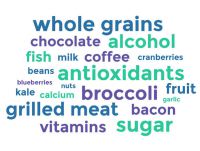About-cancer/causes-prevention/risk/diet/zh
Jump to navigation
Jump to search
饮食
许多研究已经研究了特定饮食成分或营养素与癌症风险增加或降低相关的可能性。 在实验室和动物模型中对癌细胞的研究有时提供了证据,表明分离出的化合物可能具有致癌性(或具有抗癌活性)。
但是,除了少数例外,对人类的研究尚未明确表明任何饮食成分都会导致或预防癌症。 流行病学研究的结果有时会比较患有和没有癌症的人的饮食,这表明患有和没有癌症的人在特定饮食成分上的摄入有所不同。
但是,这些结果仅表明饮食成分与癌症风险的变化有关,而不是饮食成分引起或引起风险的变化。 例如,患有和没有癌症的研究参与者除了饮食外,可能在其他方面也有差异,并且可能有其他差异解释了癌症的差异。
从流行病学研究中发现饮食成分与癌症风险降低相关的证据时,可以进行随机试验以验证这种可能性。 饮食组的随机分配可确保高营养素摄入量和低营养素摄入量之间的任何差异均归因于营养素本身,而不是其他未发现的差异。 (出于道德原因,当有证据表明饮食成分可能与罹患癌症的风险增加有关时,通常不会进行随机研究)。
科学家研究了许多添加剂,营养素和其他饮食成分,以期可能与癌症风险相关。 这些包括:
- 丙烯酰胺
- 丙烯酰胺是烟草烟雾和某些食物中的化学物质。 当某些蔬菜(例如土豆)加热到高温时,可以生产这种产品。 动物模型研究发现,丙烯酰胺暴露会增加几种癌症的风险。 但是,没有一致的证据表明饮食中摄入丙烯酰胺与人类罹患任何类型癌症的风险有关。 有关更多信息,请参见丙烯酰胺和癌症风险情况说明书。
- 醇
- 尽管有人怀疑红酒可以降低患癌症的风险,但尚无科学证据证明这种关联。 而且,酒精是已知的癌症原因。 大量饮酒或经常饮酒会增加患上口腔癌(不包括嘴唇),咽部(咽喉),喉部(语音盒),食道,肝,乳腺,结肠和直肠癌的风险。 饮酒的人会增加患上癌症的风险。 有关更多信息,请参见《酒精和癌症风险》情况说明书。
- 抗氧化剂
:抗氧化剂是会阻止其他可能破坏细胞的化学物质(称为自由基)的活性的化学物质。 实验室和动物研究表明,外源性抗氧化剂可以帮助预防与癌症发展相关的自由基损害,但是对人体的研究还没有令人信服地证明服用抗氧化剂补充剂可以帮助降低罹患癌症或死亡的风险。 一些研究甚至表明某些癌症的风险增加。 有关更多信息,请参见抗氧化剂和癌症预防情况说明书。
- 人造甜味剂
:已经对几种人造甜味剂的安全性进行了研究,包括糖精,阿斯巴甜,乙酰磺胺酸钾,三氯蔗糖,纽甜和甜蜜素。 没有明确的证据表明在美国可商购的人造甜味剂与人类患癌症的风险有关。 有关更多信息,请参见人工甜味剂和癌症情况说明书。
- Calcium
- Calcium is an essential dietary mineral that can be obtained from food and supplements. Research results overall support a relationship between higher intakes of calcium and reduced risks of colorectal cancer, but the results of studies have not always been consistent. Whether a relationship exists between higher calcium intakes and reduced risks of other cancers, such as breast and ovarian cancer, is unclear. Some research suggests that a high calcium intake may increase the risk of prostate cancer. For more information, see the fact sheet on Calcium and Cancer Prevention.
- Charred meat
- Certain chemicals, called HCAs and PAHs, are formed when muscle meat, including beef, pork, fish, and poultry, is cooked using high-temperature methods. Exposure to high levels of HCAs and PAHs can cause cancer in animals; however, whether such exposure causes cancer in humans is unclear. For more information, see the Chemicals in Meat Cooked at High Temperatures and Cancer Risk fact sheet.
- Cruciferous vegetables
- Cruciferous vegetables contain chemicals known as glucosinolates, which break down into several compounds that are being studied for possible anticancer effects. Some of these compounds have shown anticancer effects in cells and animals, but the results of studies with humans have been less clear. For more information, see the Cruciferous Vegetables and Cancer Prevention fact sheet.
- Fluoride
- Fluoride in water helps to prevent and can even reverse tooth decay. Many studies, in both humans and animals, have shown no association between fluoridated water and cancer risk. For more information, see the Fluoridated Water fact sheet.
- Tea
- Tea contains polyphenol compounds, particularly catechins, which are antioxidants. Results of epidemiologic studies examining the association between tea consumption and cancer risk have been inconclusive. Few clinical trials of tea consumption and cancer prevention have been conducted and their results have also been inconclusive. For more information, see the fact sheet on Tea and Cancer Prevention.
- Vitamin D
- Vitamin D helps the body use calcium and phosphorus to make strong bones and teeth. It is obtained primarily through exposure of the skin to sunlight, but it can also be obtained from some foods and dietary supplements. Epidemiologic studies in humans have suggested that higher intakes of vitamin D or higher levels of vitamin D in the blood may be associated with a reduced risk of colorectal cancer, but the results of randomized studies have been inconclusive. For more information, see the Vitamin D and Cancer Prevention fact sheet.
